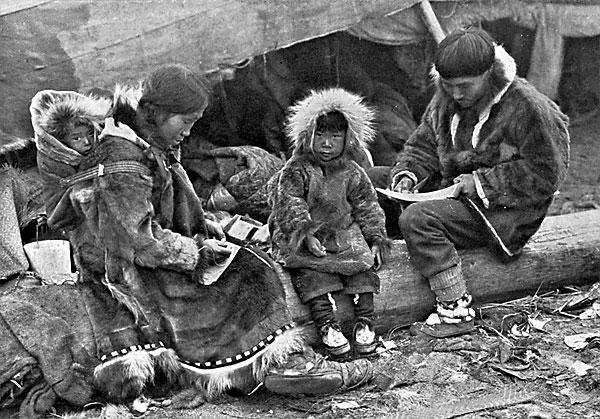The Ghost who was Afraid of being Bagged
The wife used often to say to her mate, “If you had not the means to support a wife, why did you marry me? People who have not means ought not to indulge in the luxury of a wife. When I was in my father’s house I had plenty to eat, but it seems that I have come to your house to fast. Widows only fast; I have become a widow in your life-time.” She was not content with mere words; she got very angry one day and struck her husband with the broomstick of the house.
Stung with shame, and abhorring himself on account of his wife’s reproach and beating, he left his house, with the implements of his craft, and vowed never to return and see his wife’s face again till he had become rich.
He went from village to village, and towards nightfall came to the outskirts of a forest. He laid himself down at the foot of a tree, and spent many a sad hour in bemoaning his hard lot.
It so chanced that the tree, at the foot of which the barber was lying down, was dwelt in by a ghost. The ghost, seeing a human being at the foot of the tree, naturally thought of destroying him. With this intention the ghost alighted from the tree and, with outspread arms and a gaping mouth, stood like a tall palmyra tree before the barber and said, “Now, barber, I am going to destroy you. Who will protect you?”
The barber, though quaking in every limb through fear and his hair standing erect, did not lose his presence of mind, but with that promptitude and shrewdness which are characteristic of his fraternity, replied, “O spirit, wait a bit, and I’ll show you how many ghosts I have captured this very night and put into my bag, and right glad am I to find you here, as I shall have one more ghost in my bag.”
So saying the barber produced from his bag a small looking-glass, which he always carried about with him along with his razors, his whet-stone, his strop and other utensils, to enable his customers to see whether their beards had been well shaved or not. He stood up, placed the looking-glass right against the face of the ghost, and said, “Here you see one ghost which I have seized and bagged; I am going to put you also in the bag to keep this ghost company.”
The ghost, seeing his own face in the looking-glass, was convinced of the truth of what the barber had said and was filled with fear. He said to the barber, “O, sir barber, I’ll do whatever you bid me, only do not put me into your bag. I’ll give you whatever you want.”
The barber said, “You ghosts are a faithless set; there is no trusting you. You will promise, and not give what you promise.”
“O, sir,” replied the ghost, “be merciful to me; I’ll bring to you whatever you order, and if I do not bring it, then put me into your bag.”
“Very well,” said the barber, “bring me just now one thousand gold mohurs, and by to-morrow night you must raise a granary in my house and fill it with paddy [unmilled rice]. Go and get the gold mohurs immediately, and if you fail to do my bidding you will certainly be put into my bag.”
The ghost gladly consented to the conditions. He went away and, in the course of a short time, returned with a bag containing a thousand gold mohurs. The barber was delighted beyond measure at the sight of the gold mohurs. He then told the ghost to see to it that by the following night a granary was erected in his house and filled with paddy.
It was during the small hours of the morning that the barber, loaded with the heavy treasure, knocked at the door of his house. His wife, who reproached herself for having in a fit of rage struck her husband with a broomstick, got out of bed and unbolted the door. Her surprise was great when she saw her husband pour out of the bag a glittering heap of gold mohurs.
The next night the poor devil, through fear of being bagged, raised a large granary in the barber’s house and spent the live-long night in carrying on his back large packages of paddy till the granary was filled up to the brim.
The uncle of this terrified ghost, seeing his worthy nephew carrying on his back loads of paddy, asked what the matter was. The ghost related what had happened.
The uncle-ghost then said, “You fool, you think the barber can bag you! The barber is a cunning fellow; he has cheated you, like a simpleton as you are.”
“You doubt,” said the nephew-ghost, “the power of the barber! Come and see.”
The uncle-ghost then went to the barber’s house and peeped into it through a window. The barber, perceiving from the blast of wind which the arrival of the ghost had produced that a ghost was at the window, placed full before it the self-same looking-glass, saying, “Come now! I’ll put you also into the bag.”
The uncle-ghost, seeing his own face in the looking-glass, got quite frightened, and promised that very night to raise another granary and to fill it, not this time with paddy, but with rice.
So in two nights the barber became a rich man, and lived happily with his wife begetting sons and daughters.
Next: The Bald Wife
(1000 words)

















